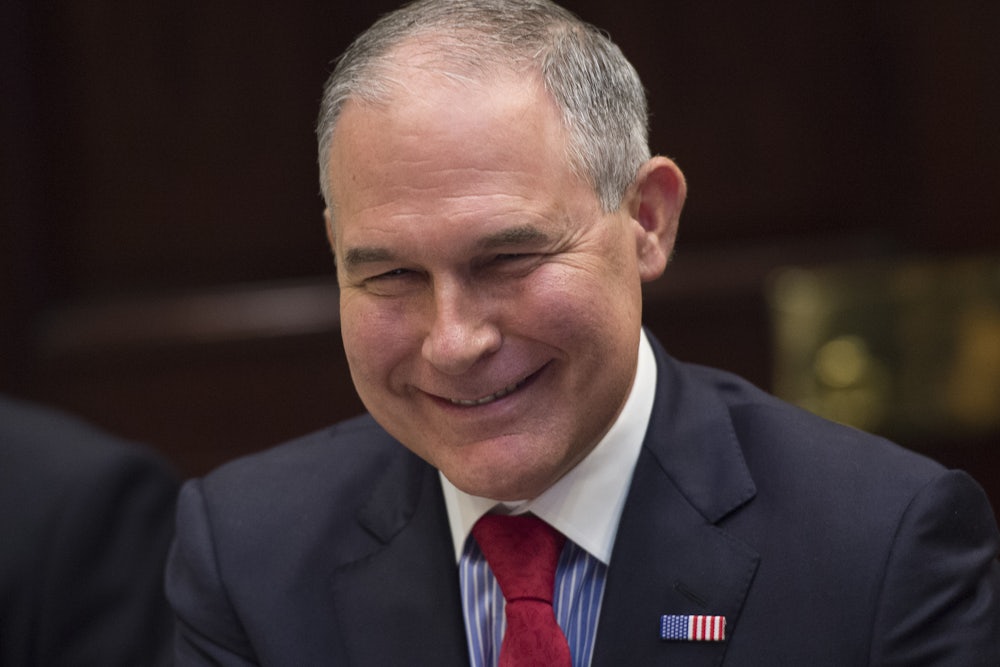Scott Pruitt, the head of the Environmental Protection Agency, cast doubt on climate science on Tuesday, telling a Nevada TV station, “I think it’s pretty arrogant for people in 2018 to say, ‘You know what, we know what the ideal surface temperature should be in the year 2100.’” Pruitt was not speaking off the cuff; he speaks almost exclusively in prepared talking points, and the “arrogance” remark is no exception. In fact, in an interview with The New York Times’ Michael Barbaro last week, he said, “Do we know what the ideal surface temperature should be in the year 2100 or year 2018? It’s fairly arrogant for us to think we know exactly what it should be in 2100.”
Scientists have published thousands of peer-reviewed articles detailing what will happen to our world if global warming continues unabated. The seas will rise, swamping our coastal cities; natural disasters (hurricanes, tornadoes, droughts, wildfires) will become more extreme; there will be hotter heat waves, colder deep-freezes; and of course millions will die as a result. But humanity can avert this, scientists say, by preventing the average surface temperature of the Earth from rising more than two degrees Celsius above pre-industrial levels.
To most people, that’s an educated warning. To Pruitt, that’s “arrogance.”
Republicans have tried this argument in the past, and it has not gone over well. “To assume that [climate change] is a problem is to assume that the state of Earth’s climate today is the optimal climate,” Michael Griffin, George W. Bush’s NASA administrator, said in a 2007 interview with NPR. “I think that’s a rather arrogant position for people to take.” His own employees were outraged. “It’s an incredibly arrogant and ignorant statement,” James Hansen, at the time NASA’s top climate scientist at the Goddard Institute for Space Studies, told ABC News. “It indicates a complete ignorance of understanding the implications of climate change.” The Bush White House insisted that Griffin was only joking, and Griffin later apologized.
James Inhofe, the snowball-wielding climate-change denier and Republican senator from Oklahoma, put his unique twist on this talking in 2015: “The arrogance of people to think that we, human beings, would be able to change what [God] is doing in the climate is to me outrageous.” (The Washington Post’s editorial board accused him of “benighted complacency.”) That same year, weeks before announcing his doomed candidacy for president, former Florida Governor Jeb Bush said, “For the people to say the science is decided on this is really arrogant, to be honest with you.” The line has even traveled overseas: Former French President Nicolas Sarkozy said 2016, “You need to be as arrogant as men are to believe we changed the climate.”
The New York Times’ Timothy Egan was properly incredulous after Bush’s remark: “Is it arrogant to say that smoking causes lung cancer? That you shouldn’t text and drive? That the American diet and lifestyle cause Type 2 diabetes, which is killing people? There is some wiggle room in each of those assertions. But you test them at your peril.” But Republicans use this talking point because it’s politically expedient, playing into the conservative characterization of liberals as self-important, know-all elitists.
In truth, the insistence that scientific experts are “arrogant” speaks to the growing anti-intellectualism of the Republican Party. By and large, scientists don’t do research to confirm their biases or boost their egos. They do it because the scientific method has proven itself to be the most reliable to determine the truth and quantify risk. It may sound unbelievable that mankind is so powerful as to warm Earth’s atmosphere, and even more unbelievable that mankind is capable of reversing it. But what’s truly arrogant is to be a lifelong lawyer and politician who thinks he knows better than thousands of scientists.
